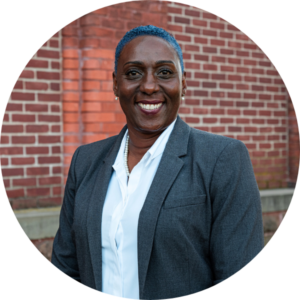CVLC News
Staff Spotlight : Juliet Taylor
Written by Anne Lee
Juliet Taylor is a woman of transitions.
She was born and raised in Jamaica before moving to the United States. One of the first transitions was moving from one culture to another, being a Jamaican woman living in the West Indies to then being a Jamaican woman living in America. The second and the most profound was transitioning from civilian life to military life, and experiencing reverse culture shock as a female combat veteran reintegrating back to civilian society. She then went from being a regular US citizen to joining the military. In the Army, where she served from 2000 to 2015, she transitioned from being a combat service member with 11 years of active duty in Iraq to serving in the National Guard. As the Intake and Program Access Specialist at CVLC, Juliet is one of the first people Veterans speak with when seeking legal help. The series of transitions throughout her life motivates her with empathy as she guides veterans to resources for the hurdles they face while re-entering civilian life.
Juliet was initially hesitant about working at a legal center. With a masters in mental health counseling from the University of Bridgeport, she wanted to work specifically for the veteran population. She knows transitions are rough. “It’s almost like going through basic training all over again,” she says. How could lawyers even understand, never mind solve, veterans’ deep emotional, mental, and personal struggles? She soon realized that many Veterans are barred to access to care and service due to a legal issue. Juliet’s platform at CVLC allows her to share her journey with other veterans while navigating them toward a path of practical help.
An advocate for women veterans, Juliet recognizes specific challenges for servicewomen. Balance is difficult in the military, but Juliet was looking for balance. She wanted to be a career woman, but she also wanted to be a good mother. She wanted a social balance and to be in a relationship. Military gave her a sense of security–she did not have to worry too much about stable housing, food, her children’s education, or medical insurance. But this made it even harder for women like her to speak up about their silent suffering. If you cannot keep up with your job, Juliet says “you’re not just losing a paycheck; you’re losing your safety net.”
These challenges continue after service. With many single parents being women–Juliet included–she notices that women veterans often do not file claims early enough. Instead, they jump right into the caregiver role when they return from service. Scheduling a VA appointment can be impossible with a working mother’s schedule. The determination to be self-sustainable takes a mental toll. On active duty, there are no excuses. “The military is no place to be sick. There is no department where you can rest until you get better. You can pause for about 10 seconds,” Juliet explains. This lingering mentality leads to shame when struggling with personal duties like motherhood. “What can be my excuse? By the time we come home, we are broken severely but have to start up again.”
Despite everything, Juliet sees hope for women veterans and service members. Rather than big systematic change, she sees improvement in the little things: uniform adjustments to accommodate female body shapes and hair, for example. A mandatory wool hat used to give Juliet a headache and pull her hair out. Allowing women to be feminine by putting on a little nail polish is also new. These were the changes Juliet experienced during and after the military. Without such strict rules and regulations, “you can figure out how to be a girl.” Juliet is optimistic that the new generation of women in service, including her 20-year-old daughter in the Air Force, can fulfill their duty to the country and find the balance Juliet has been seeking.
Photo credit: Photo by David Apuzzo.
About Juliet Taylor
Juliet Taylor is a decorated Army Veteran having served for over eleven years, including deployments to Iraq and Afghanistan. She brings to CVLC’s screening team extensive experience as a Veterans advocate, having worked tirelessly with several Veteran and community organizations across Connecticut. Juliet has completed her Licensed Professional Counselor degree at the University of Bridgeport and she is currently the State Commander for the Disabled American Veterans (DAV).

